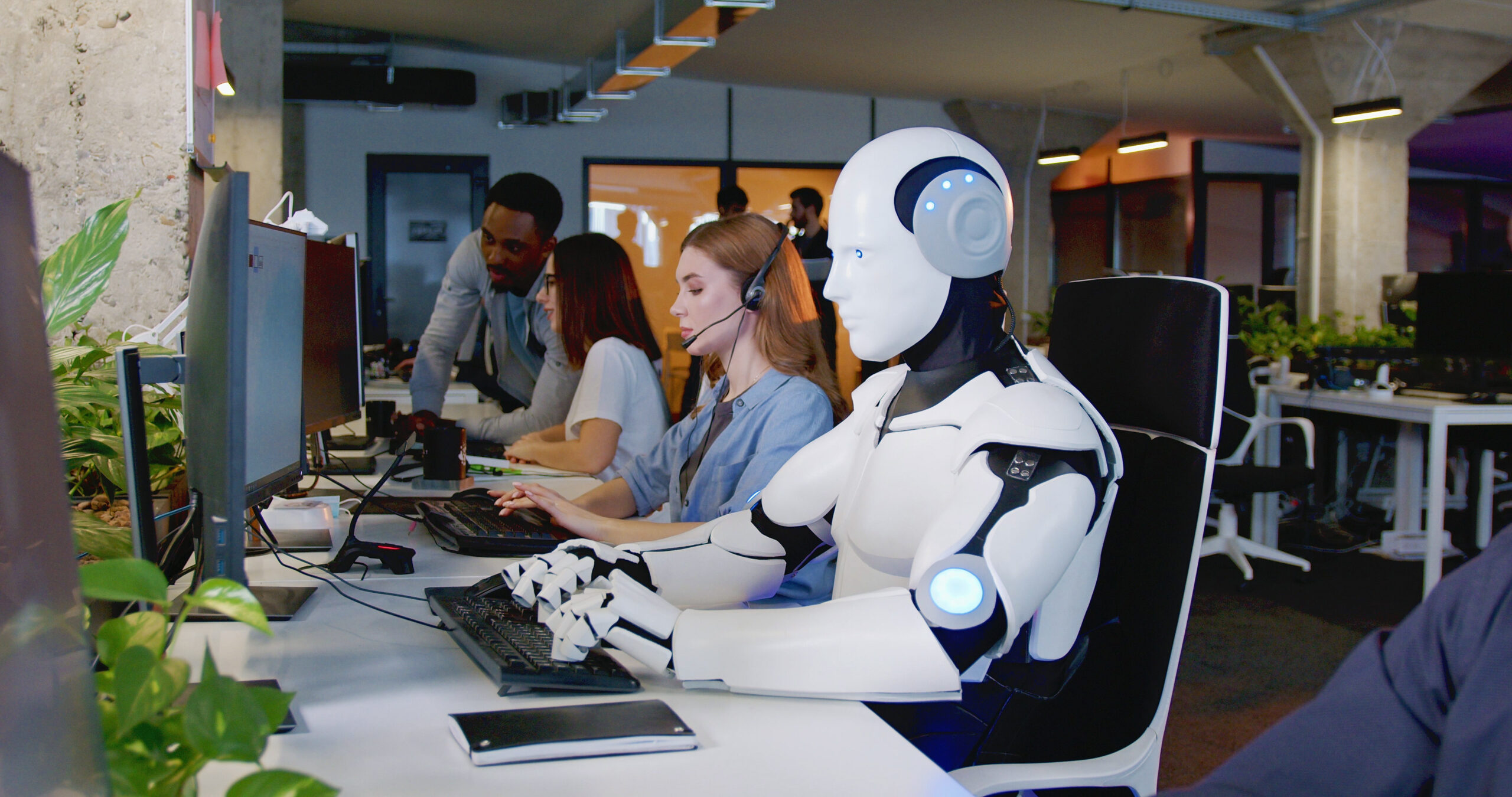
Blog
Embracing responsible AI: navigating the future with awareness and opportunity

As artificial intelligence (AI) continues to advance and integrate into various sectors of society, including business operations, manufacturing and healthcare innovation, the importance of using AI responsibly becomes increasingly clear. In this rapidly evolving landscape, careful consideration of how AI is developed and applied is paramount. Skaylink is dedicated to assisting both businesses and individuals in understanding and implementing responsible AI practices. We provide expert advice and guidance to help navigate the complex landscape of AI, focusing on the potential benefits and the ethical considerations it entails.

The development of the generative era in AI, particularly through technologies such as Large Language Models (LLMs), poses a new set of ethical challenges. These models can produce content so close to human output that it is difficult to distinguish the real from the fake, raising issues of copyright infringement and the possibility of abuse. It becomes crucial to develop a set of ethical standards to guide the use of generative AI technologies. Basic principles like transparency, accountability, and fairness should be the basis for any AI-related project. Making sure that there is explicit communication about the type and purpose of AI-generated content and applying methods to detect and reduce biases in that output are important steps in maintaining the honesty and reliability of AI applications.
As we embrace AI as a powerful tool for innovation and transformation, we must ensure that it adheres to the highest standards of quality and ethics. We believe that AI should embrace veracity, alignment, fairness and explainability as core principles. Veracity means that AI should generate accurate and reliable content, avoiding hallucinations or distortions that could mislead or harm users. Alignment emphasizes that AI follows a clear content policy that reflects our values and goals and avoids any harmful or malicious use of the technology. Fair AI should respect the diversity and dignity of all people and avoid any bias or discrimination that could undermine equity and justice in society. Finally, explainability emphasizes that AI should provide clear and understandable reasons for its outputs, allowing users to trust and verify its decisions and actions. By following these principles, we aim to create AI systems that are trustworthy, beneficial and accountable.
Recognizing and overcoming biases
One of the most enlightening aspects of AI development is its ability to mirror, and thus highlight, the biases inherent in society. Generative AI’s ability to reflect societal biases is notably significant, given its role in content creation and decision-making processes. AI systems learn from massive datasets, and these datasets may inadvertently reflect the biases of their human creators. Addressing these biases requires an inclusive approach to AI development, incorporating diverse perspectives and datasets from the outset. By doing so, we not only improve the equity and fairness of AI-generated outputs but also take a step toward addressing broader societal prejudices. This dual process of reflection and action can propel us towards more inclusive and equitable technologies and communities.
The role of AI: a tool for human empowerment
It’s essential to remember that AI is, at its core, a tool created by and for humans. Its potential is boundless, yet it is not an almighty solution. The value and impact of AI lies in how we choose to shape, design, and use it. As we stand at the summit of this technological revolution, it is our responsibility to steer AI towards applications that enrich human life, respect our ethical values, and safeguard our collective welfare. Whether it’s enhancing productivity, solving complex problems, or driving innovation, AI’s contribution is ultimately determined by human intention and guidance.
Recognizing AI as a tool, rather than a replacement for human intelligence, underscores the importance of a partnership between humans and AI. In the generative era, this partnership takes on new dimensions. Humans must guide AI in generating content and making decisions, ensuring that they are consistent with ethical standards and societal needs. This human-AI partnership is crucial for leveraging AI’s capabilities responsibly, directing its generative power towards solving complex problems, enhancing creativity, and driving sustainable growth.

Facilitating knowledge transfer and enablement
AI has an incredible ability to process and synthesize information, making it a powerful ally in knowledge transfer and enablement. Through personalized learning platforms, AI can adapt to individual learning styles, paces, and preferences, offering tailored educational experiences that were once unimaginable. In the professional realm, AI-driven tools can democratize access to expert knowledge, automate routine tasks, and enable humans to focus on creative and strategic pursuits. This symbiotic relationship between AI and human intelligence paves the way for a future where learning and professional development are more accessible, efficient, and tailored to individual needs and goals.
Understanding the European AI Act
The European AI Act is a pioneering legislative framework proposed by the European Commission, aimed at regulating AI applications to ensure they are safe, transparent, and governed by ethical principles. This act is an important step towards harmonizing AI standards across Europe, setting a global benchmark for the responsible development and use of AI technologies. It categorizes AI systems based on their risk level to human rights and safety, requiring stringent compliance for high-risk applications.
Understanding this regulatory landscape is crucial for businesses and developers aiming to leverage AI solutions, to ensure that their innovations comply with these new standards and contribute to a trustworthy AI ecosystem. The introduction of EU regulations may initially raise concerns among small and mid-sized companies about navigating new rules and facing potential penalties. However, the reality is that the regulatory framework should not be seen as an obstacle.
In fact, the requirements set forth by the European Union, even for highly regulated systems, provide an opportunity to enhance documentation, refine testing procedures, and increase transparency in decision-making processes. Ultimately, these measures can lead to greater trust in the technology, demonstrating that regulation can serve as a catalyst to improve operational and ethical standards.
Embracing responsible AI as an opportunity
The journey towards responsible AI is fraught with challenges, from ethical dilemmas to regulatory hurdles. However, it is also ripe with opportunities for innovation, growth, and societal betterment. Responsible AI is not a specter to be feared but a horizon to be embraced. It calls for a collaborative effort among developers, businesses, regulators, and society at large to cultivate an AI-powered future that respects human dignity, promotes equality, and safeguards our collective future.
One of the key steps towards this goal is to be aware of the ethical and societal implications of the technology, as well as the regulatory frameworks that govern its use. This awareness can help developers and businesses to think in a human-centric way, designing and deploying AI systems that respect human values, rights, and dignity. Moreover, it is helpful to focus on solving narrow problems that address specific needs and challenges, rather than pursuing general or abstract goals. Finally, responsible AI involves implementing the technology in a transparent, accountable, and robust manner to ensure its reliability, explainability, and fairness.
The main takeaway from these steps is that responsible AI starts with a business problem, not with the technology. By focusing on the problem and its context, developers and businesses can leverage AI solutions that are relevant, effective, and ethical, creating value for themselves and their stakeholders. Responsible AI is not just a matter of compliance, it is a matter of innovation and excellence.
At Skaylink, we are committed to guiding our clients through the complex landscape of responsible AI. Whether you have questions, concerns, or are seeking a comprehensive roadmap for integrating AI into your operations ethically and effectively, our team of experts is here to support you. Together, we can harness the potential of AI to not only transform businesses but also contribute to a more just, knowledgeable, and empowered world.
Responsible AI is a journey, and every step taken with awareness and purpose moves us closer to realizing its full potential. Let’s embark on this journey together, with open minds and a shared vision for a future where technology and humanity come together in harmony and progress.